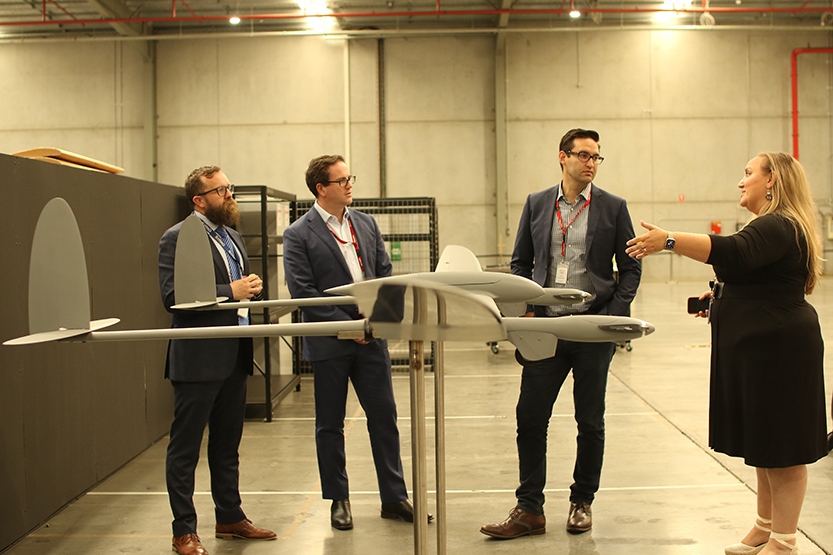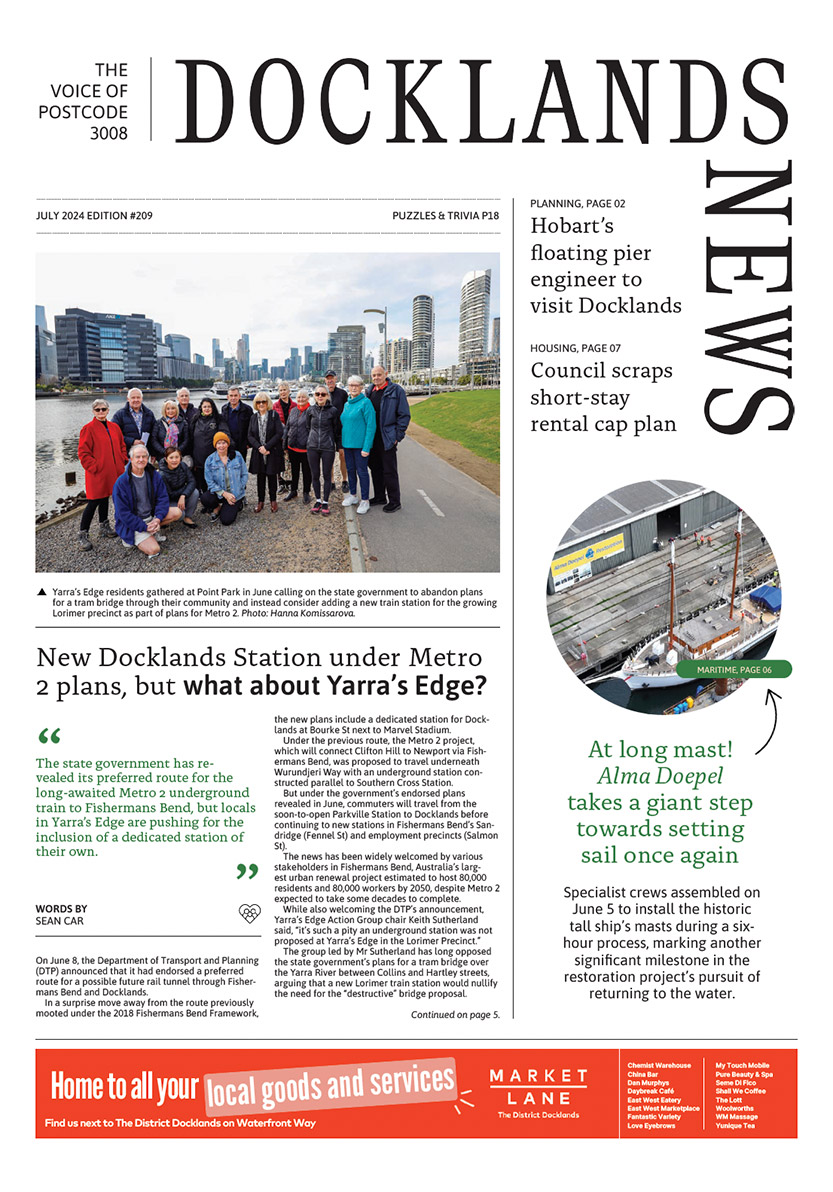Engineering the systems that we all rely on
SYPAQ CEO and aerospace engineer Amanda Holt’s passion for careers in science, technology, engineering and maths (STEM) is palpable.
Having led the privately-owned Fishermans Bend based engineering company SYPAQ since 2015, Ms Holt continues to use her position to advocate for pathways into STEM among the next generation.
But, perhaps most significantly, it’s her experience, belief, and passion as both an engineer and a business leader that is inspiring more women to pursue opportunities in the field – a role she takes very seriously.
“I think one of the things we all [as women] underestimate early in our career is the importance of visibility,” she said. “That’s what I spend a lot of time on – public speaking, doing things on panels and the rest – just so that people can see different ways of doing things.”
“What I’m really optimistic about is that every time I do that there’s someone far brighter and more interesting in the room than I am that will put their hand up next time … thinking ‘I’ll give it a go!’ I think the more of that we see, the better for everyone.”
But while she described herself as a “great big nerd” as a child who was focused on getting 100 per cent on her maths and physics tests, being surrounded by science at home from a young age meant she was always destined for a career in STEM.
As an 11-year-old, she said she already knew that she wanted to be an aerospace engineer, recounting Christmas lunches solving maths problems with family members, some of whom had backgrounds in physics and biochemistry.
However, when it came time to pursue her dreams at university, she was able to identify something which in many ways is the undercurrent of the government of today’s ambition for co-locating innovation and advanced manufacturing in Fishermans Bend. In addition to studying her area of passion, aerospace engineering, she concurrently completed a business degree – a combination she hoped would make her valuable to future employers.
“I had identified back then that most of us working in the particularly nerdy, rocket science type spaces often aren’t focused on other business aspects such as leading people or managing finances,” she said.
“It was really the combination of both of those elements that has really seen me work through the career path that I have.”
Having gone on to work in a number of roles across Australian organisations and multinationals, it was 15 years ago when Ms Holt joined SYPAQ – a company founded in 1992 by former air force communications engineer George Vicino.
From keeping planes in the sky and developing our national defence infrastructure, to providing essential software and cyber security solutions for government and business, SYPAQ’s work, in so many ways, is all around us … just perhaps without us knowing!
What began as a family-owned business, SYPAQ last year celebrated its 30th anniversary having transformed from being a predominantly services-based company to one also now heavily invested in research and development (R&D), particularly in the areas of autonomous and remote sensing systems.
Describing these technologies as SYPAQ’s “sweet spot”, Ms Holt said they were areas which were now evolving into unique integrated artificial intelligence lab development and mission experimentation with its largest client – the Department of Defence.
But Defence isn’t the only federal government department SYPAQ works with. At the other end of the spectrum, it provides its second largest client, Services Australia, with the critical systems that support essential services such as Centrelink and Disaster Recovery Payments.
“Whether it’s payment platforms for making sure everyone gets paid their pension on time and correctly calculated, or whether it’s the electronic systems that’s making sure an aeroplane stays in the sky – the underlying discipline is the same,” Ms Holt said.
SYPAQ, which stands for “systems, projects and quality”, has now grown into a company with around 230 staff across Australia, the majority of which are either based in Canberra or at its headquarters here in Melbourne’s Fishermans Bend.
The core members of its team come from an aerospace or a software engineering background, but their diverse range of talents extend to everything from material scientists, data analysts and architects, to mechanical engineers, cyber security specialists and flight operations experts.

With Ms Holt having overseen much of the company’s growth during her seven years as CEO, she said the decision to leverage its “incredible engineering talent” by investing in the development of its own intellectual property (IP) had been central to SYPAQ’s rapid rise.
“About 10 years ago the business reached a scale where we were being invited into what we used to call troubled project remediation,” she said.
“Now we were paid very well for that work, but it wasn’t IP that was reusable, you couldn’t tell anyone exactly what you did so it wasn’t the appropriate way to scale the business.”
“We had a look at where our standing was in the market and had a look at the resources we had on board. So, rather than being purely services we could move into product and solution provision as well.”
“We went and sought out some international partners who had some really unique technologies that we thought were relevant to the Australian market to give us the opportunity to learn to sell a product or solution into defence and emergency services.”
That gave us the confidence that, as a business, the customer would take us seriously and that then gave us the confidence to become the business we are today which is very much building out products and services informed through our R&D investments.
As an “incredibly exciting space to be working in”, Ms Holt said it was why she was such a big advocate for careers in STEM, “because you know that the problem is always changing, and technology is evolving”.
“You’re never going to work on the same problem that you worked on five years ago because the world has moved on,” she said, adding, “you’re always learning.”
“I think that’s one of the things we forget about from STEM careers is that you’re problem solving and that is inherently creative, so you want the kids who are getting 100 per cent on their maths and physics tests and all of those things to make sure your aeroplane stays in the sky, but there’s no point in reengineering a version of something that someone else has already created.”
“Being able to identify what the art of the possible is in this rapidly evolving technological space, and being able to interpret what the future customer needs are going to be so that you’re targeting your R&D really effectively is a really exciting part of the world to be operating in … we don’t get bored here!”
And as the Fishermans Bend precinct slowly evolves around its Bertie St headquarters, Ms Holt said it was another reason why she and SYPAQ were excited and optimistic about the future for STEM in Australia.
With SYPAQ engaging with more than 700 Australian suppliers, she said it was the technical support network and the talent in its “broader ecosystem” which underpinned much of the company’s success.
Already home to an incredible range of innovative companies, the University of Melbourne will also soon open its engineering and design campus to students in Fishermans Bend in the coming years, while RMIT has long been touted to follow suit.
According to Ms Holt, this growing cluster was a huge reason behind SYPAQ’s “very deliberate move” to base its headquarters in Fishermans Bend.
And, as a member of the Defence Council Victoria – an advisory body to the Victorian Government – Ms Holt already plays an active role in planning for how that sense of collaboration will play out in the precinct.
“Innovation is all about collaboration, right? There’s not one person who can solve these problems uniquely themselves,” she said.
“We were obviously disappointed that the proposed redevelopment of the area wasn’t where we hoped it would be by this point in time but it’s why we’re here, and it’s why we’re expecting the way that the area will develop over the coming decades, this will be home for us.”
“There’s nothing as valuable as being able to send a few of your engineers down the road to collaborate with one of your suppliers or your customers; that’s when the magic happens.” “And being able to do that closely and locally, having that sense of community, it rubs off on people when they come in for a job interview, or when you get high school students coming in on one of their career days.”
“We’ve got a few people in our organisation who work closely with the University of Melbourne in its innovation space. I work really closely with RMIT in its aerospace planning to try and make sure what we’re seeing and that our needs are being fed back in and vice versa … understanding what the best of learning is, how do we make sure we’re bringing people in who are going to be lifelong learners and how do we share that?” •

New Docklands Station under Metro 2 plans, but what about Yarra’s Edge?








 Download the Latest Edition
Download the Latest Edition